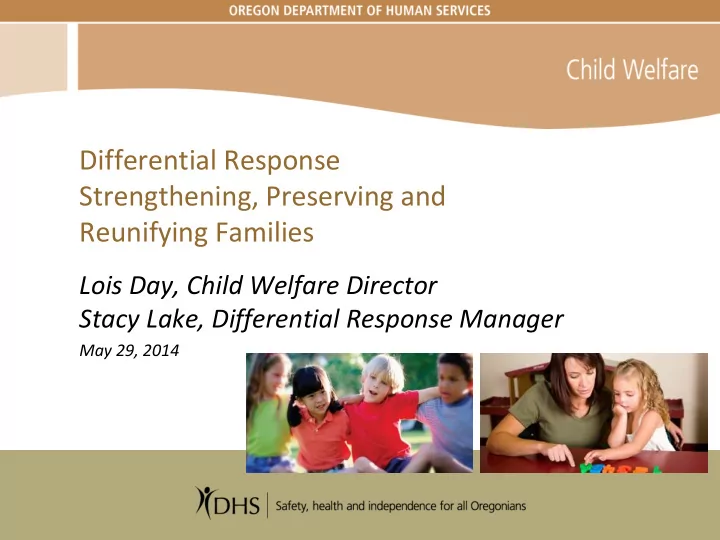

Differential Response Strengthening, Preserving and Reunifying Families Lois Day, Child Welfare Director Stacy Lake, Differential Response Manager May 29, 2014
Changing Our Practice Circumstances and needs of families differ and so should system’s response. Oregon found that the majority of Child Welfare cases involve neglect and threat of harm neglect. Children enter foster care at higher rates and stay longer due to neglect, indicating our interventions are not as effective as needed. Majority of reports received today do not need adversarial approach or court-ordered interventions. Child protection intervention is governmental intrusion into private family life; level/type of intrusion should closely match presenting concern. 2
Differential Response Addition of alternative child welfare interventions that focus less on investigative fact finding and more on assessing and insuring child safety by helping the family identify their needs to keep their children safe. Evolved out of the growing understanding that not all families need an investigative intervention to address child safety concerns. Earlier interventions that connect families with preventive, community based services can prevent further contact with the Child Welfare system. It will also increase the number of children who are able to be safely served at home. 3
Differential Response Vision Statement As a result of Oregon’s implementation of DR, the following results will occur: Children will be kept safely at home and in their communities; using the Oregon Safety Model and its core concepts and tools to guide decisions making. The community and Oregon DHS will work in partnership with a shared responsibility for keeping children safely at home and in their communities. Families will partner with Oregon DHS to realize their full potential and develop solutions for their challenges. Fewer children will re-enter the child welfare system through improved preventative and reunification services for families. Disproportionality will be reduced among children of color. Private agencies and community organizations will experience stronger partnerships with Oregon DHS on behalf of children and families. 4
Successful Implementation Four critical components: Statewide implementation of Strengthening, Preserving and Reunifying Families Oregon Safety Model fidelity work Approval by the Legislature for 110 positions for Child Welfare field staff and an additional nine ICWA positions Differential Response model development 5
Differential Response Update Serving families • Klamath and Lake Counties – May 27 th • Lane County – May 29 th Over 500 employees and community partners participated in training. Initial changes to the OR-Kids technology system. Updated Administrative Rules, policies, procedures and business processes. 6
Strengthening, Preserving and Reunifying Families ORS 418.575-418.598 County partners encouraged to form collaborations. • DHS lead agency. • Approach – gap analysis with county partners to identify needs. • Identify providers and execute contracts for the services. Provide an array of services – depending on resources and availability. • Services must be culturally competent and include evidence-informed or evidence-based practices. Client-focused functional outcome measures may be used as a basis for funding programs and entering into or renewing contracts with programs. DHS shall seek federal approval for a renewal of our existing Title IV-E waiver, or a new waiver to apply federal savings in the future to the service array. 7
Service Array Contracts 8
Service Array Contracts cont. 86 contracts in place in 19 counties • Columbia, Tillamook, Multnomah, Yamhill, Linn, Benton, Lincoln, Lane, Douglas, Coos, Jackson, Josephine, Deschutes, Klamath, Lake, Umatilla, Malheur, Clackamas, and Washington. 5 counties in the contracting process and close to execution (approximately 9 contracts). 6 additional counties have proposals approved and moving into the contracting process (approximately 16 contracts). 6 counties drafting proposals. 9
Themes in the Service Array Navigators: Specialists to help navigate social service agencies. Multnomah, Lane, Clackamas, Tillamook, Coos, Klamath, Lake, and Douglas Parenting: Father, Culturally Specific, and Intensive parenting classes. Multnomah, Lane Parent Mentoring : Specialists to reinforce parenting behaviors, supportive services. Tillamook, Clackamas, Umatilla, Josephine, Jackson, Multnomah, Lane, Klamath, Deschutes, Coos, and Washington Relief Nursery : Daycare, parenting, support services. Umatilla, Jackson, Coos, Malheur, Clackamas, and Deschutes Alcohol and Drug Treatment : Inpatient/Outpatient services that focus on multi-dimensional issues such as parenting, DV services, and a relief nursery. Umatilla, Clackamas, Jackson, Tillamook, Lane, Deschutes, and Yamhill Supported Housing: Short-term & emergency housing services. Umatilla, Josephine, Jackson, Multnomah, Malheur, Clackamas, Tillamook, Lane, Columbia, Yamhill, Deschutes, Washington, Benton, and Douglas Front End Interventions: Specialists (Alcohol and Drug, Mental Health, Domestic Violence, and human service generalists) responding with CPS workers. Clackamas, Umatilla, Josephine, Jackson, Malheur, Linn, Tillamook, Columbia, and Lane. Life Skills Coaches / Home Visitors: Provides similar services as Navigators. Umatilla, Josephine, Multnomah, Coos, Tillamook, and Lincoln Reconnecting Families: Specialists used to engage families and conduct relative searches for additional familial resources/placements. Josephine, Jackson, Lane, Coos, Washington, and Douglas Trauma Services and therapeutic services: Intensive services to trauma affected families and children. Multnomah, Columbia, Clackamas, Jackson, Tillamook, and Lane Family Visitation: Josephine, Jackson, Umatilla, Tillamook, Deschutes, Lincoln, and Douglas 10
Addressing Complex Family Needs The Legislative investment in the Oregon Child Welfare system helps us better address the complex needs and issues that challenge families who are struggling to keep their family safe. Implementation of service array Increasing the staffing levels to address workload Strengthen the Oregon Safety Model Implementation of Differential Response 11
Recommend
More recommend